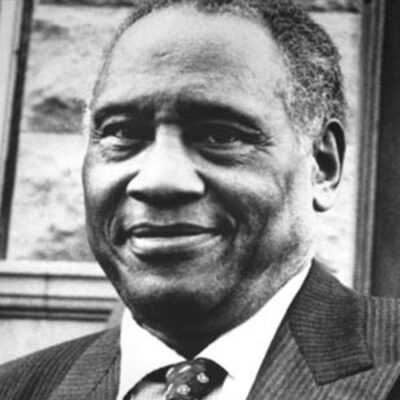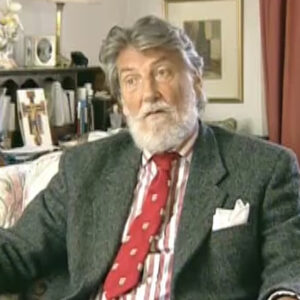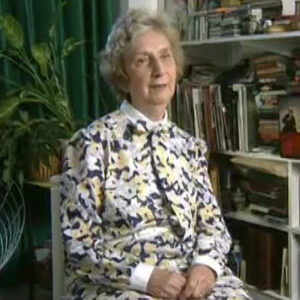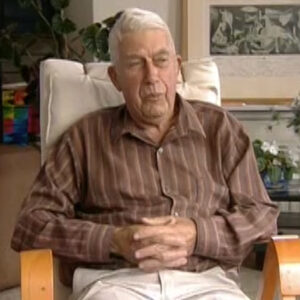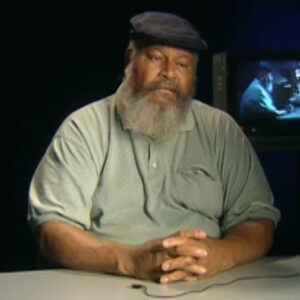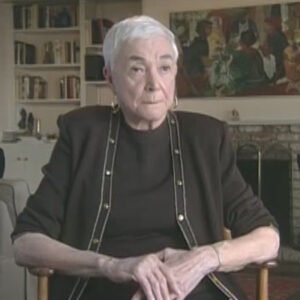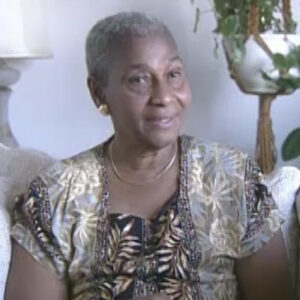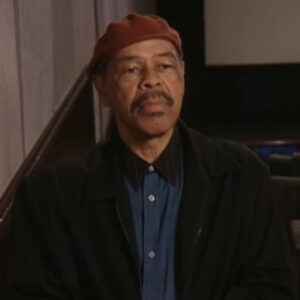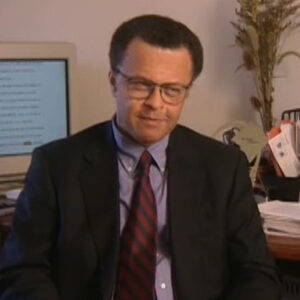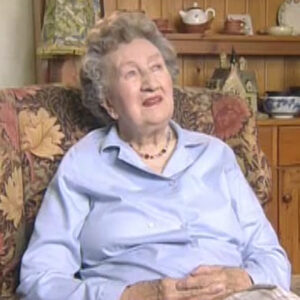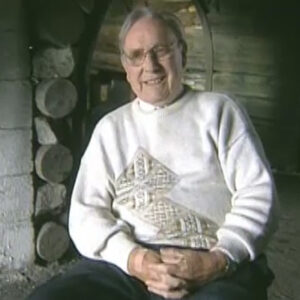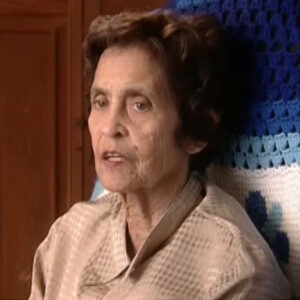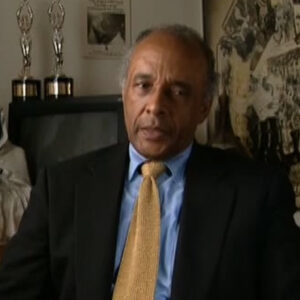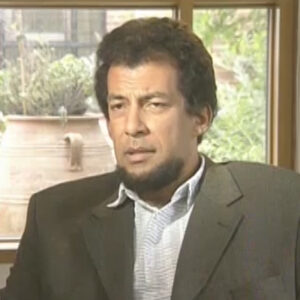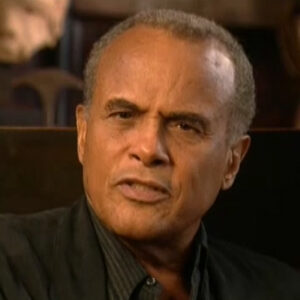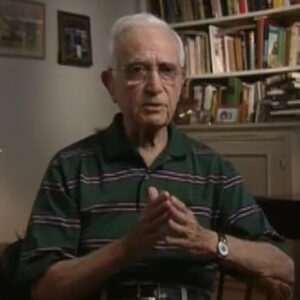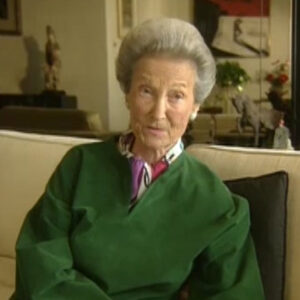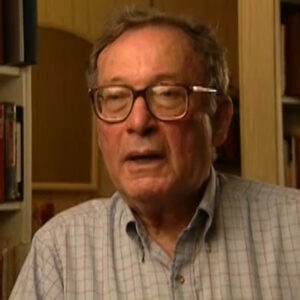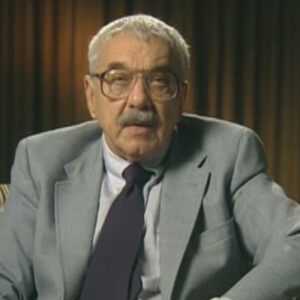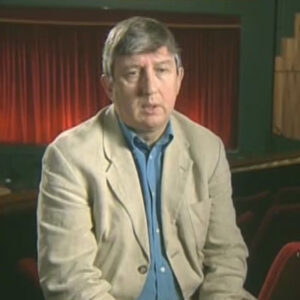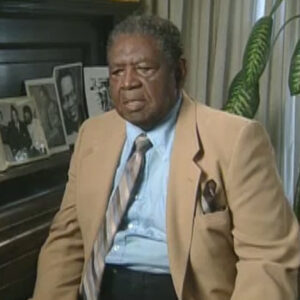Speaker What did you know about me? How well did you know him and what was the sense that you got?
Speaker Well, I never knew him personally. I was interested in whatever he had to say. I more or less agreed with what he said about what was happening, you know, racially in our country. And I had read the articles or heard about speeches or things like that, but I understood him to be probably the best known black or Negro figure of that in the United States and the world in the world.
Speaker When you when did you first thinking about presenting him on stage? When did it hit you? OK, yes. How it happened.
Speaker It’s just not right, is it. Yeah, that’s OK. It’s OK.
Speaker It’s cool stuff. We’re OK. Yeah. Oh yeah. I’m really interested in how you got so good. Give me a you know, some back up about the presentation.
Speaker It wasn’t just Paul Robeson, Paul Robeson alone. I was an impresario. I still am an impresario. And he was one of the great singers in the world, bar none. And so I found out that Paul Robeson had appeared in San Francisco, that there were pickets there and that he had quite a sizable audience, that he was successful.
Speaker And so I said to myself, Art, this man should be and has to be presented in New York City. He’s got a great voice, a great presence. And I think the public deserves to hear him and he deserves to sing.
Speaker And it is un-American not to permit him a stage.
Speaker OK, now, what was the, uh, was it was there any resistance to you?
Speaker Do you want to know truthfully? Yeah, none. I don’t understand it. I never got any hate mail. I was worried. I was frightened. My wife was braver than me. And she said, What do you mean you got to do this? So I said, look, well, I don’t know what’s going to happen. I mean, you know, they’re pickets out there. I mean, the man isn’t liked by a lot of people, you know, super Americans, you know, patriotic Americans and quotation marks. So, yes, I have fears and worries, but I felt that New York City can handle it. And it turned out to be the right decision. And thank God it turned out to be a great concert, and I’m very proud to have presented him.
Speaker What was the.
Speaker You mean give me an idea of the response of the concert after the game?
Speaker Well, let me tell you, before it sold out in a blink of an eye, I could have charged double that and I could have gotten it. I wanted to charge 250. And the manager, not Pozniak since passed, was a terrific guy, says, Art, come on, that’s cheap. What are you doing? This is a great artist. So I made it five dollars. That is the top seats. The rest went for, you know, to fifty, something like that. In those days that that was maybe a lot more money. And the reaction afterwards was almost universal. It was. I think there’s a sigh of relief outside of a review that I saw in Newsweek.
Speaker It was unanimous. That Paul Robeson was terrific, that he still had a voice, despite the fact there was some amplification, but that had to do with his recording and it was unbelievable. I mean, there were people who politically, I’m sure were much different and didn’t agree with him, but I made sure that that concert was Paul Robeson and I let him do what he did. It wasn’t a political rally, was not.
Speaker Was there any foreign response?
Speaker I mean, the Tawrrific all over Europe, Australia, the French papers right to left, all three of triumph at England.
Speaker I mean, it was unbelievable that anybody after the concert I mean, did anybody I think it was a I agree with people. I think it was not an easy thing to do given, you know, how much that weigh on your mind.
Speaker Well, the weight on my mind, it certainly did. But that’s when I started with Pete Seeger in 1955. And my partner said, you’re putting on his communist that circle in the square. So what do you mean communist? He’s one of the great folk singers is it’s heritage. Well, I put Pete Seeger in on that circle in the square at midnight. We had 200 seats and 5000 people stormed circle in the square. The police came out and the rest is history. That’s how I started in the business.
Speaker You talk about yourself a little bit.
Speaker I mean, well, now you’ve broken a lot of new people and they all, in one way or another, represented more than just their art, you know what I mean?
Speaker They represented that. Did you do you think about that or did you just come out of it?
Speaker Well, I could have deliberately thought about it, but I didn’t just pick political people or even people who agreed with me. For instance, Tom Lehrer, I don’t know what his politics are, but it’s stuff. If you play his stuff today, you’re going to hear things that are 80 percent still hold up. And I was very delighted to be putting on Mahalia Jackson in New York City before a general audience that’s outside of the church audience as she played for New York Church and Joe Bostik in New York City. So I’m very proud to bring it to the public awareness.
Speaker Let’s take people like Nina Simone, who I was delighted to be a manager for a while, and also to present her Miriam Makeba. She played for my competition, Mr Max Gordon at The Vanguard when the Blue Angel, but she played for me fifteen years, is one of the greatest artists they ever had that played at the gate. So I was I’ve always been interested and still am interested in great talent.
Speaker Did Paul Rosen say anything to you before he went on the concert and did he say anything to you after the concert? I mean, either like I’m afraid or thank you or anything. Did he say anything to you? There was no fear.
Speaker We knew we had the city in our hand. We expected what kind of reviews we didn’t know. I think we were too busy getting the show on the road to talk about anything. All I know is that at the end of the concert at Paul Robeson and his wife Islan, that embraced me and thanked me. And we had agreed that a second concert would go on after midnight and we did that on May twenty third. Again, I’m sorry, because we had a fight.
Speaker Yeah, could you just say that again about about him? What happened after the concert? His wife?
Speaker Well, what happened is both slammed slander. His wife and Paul Robeson came over and embraced me and thanked me. And they were they were very elated.
Speaker And we agreed right then and there at another concert would go on as soon as I got a date. And that date was May twenty third, which was the second concert which sold out just as fast, if not faster than the first one.
Speaker Did you ever hear did you keep in touch with them after that? I mean, did you.
Speaker Yes, we spoke together. We received the cards from then as far as, you know, our anniversary and things like that. And Mr. Robson went to London and other parts of Europe. And I also tried to get him together with Mahalia Jackson to do a concert series, which I was told I would have been delighted to to be the impresario. But it never happened. Unfortunately, that would have been something like that. Let me ask you a question.
Speaker Do you think that he really I mean, in history, that was a very, very in his history as a very significant event. OK, so do you think he realized how significant it was? And also, do you realize how significant it was?
Speaker Well, I think I think I had a glimmer that it was an important event because here the man had his passport taken away for a decade. They still his voice. It was clearly, I think, unconstitutional.
Speaker And I think the courts ruled very shortly because after the 23 third a month later of May and June of nineteen fifty eight, he received his passport and he told his audience at the last concert that he expected to get that relief that he would be permitted to travel all over the United States, all over the world. Whether he did it was a pretty bright guy. I’m sure he knew, because in February of 1958, three months before I did my concert in San Francisco, he told the audience, yes, it is a successful concert, but I don’t think I’m going to do any more concerts. Three months later, he did two more concerts, and I think the public knew that he was well and alive. And he still meant a lot to the American public, not just to the Negro public of that day.
Speaker OK, this is something else, too, this is whether any from that event I mean, you you’ve had a long career, you still have a career doing stuff and stuff you’re telling me right from that event. Were there any repercussions, good or bad, but good? Probably. In other words, did you gained your reputation as a percentage of the kind of like Growe or that it was it? Do they think of you as like a guy to create dangerous stuff for it, to have any repercussions at all in your career?
Speaker I don’t think so. And I think, you know, historically, the end of the 50s was a time that there was churning and in the village and this is one of the most important periods that have to be covered, I think, more accurately than it has been. You know, simplistically as being anti-war, pro, anything. The FOXON movement started and very strong and entered into the mainstream via the limelight as the Kingston Trio and other groups. You have the civil rights movement songs. They were heavily and mightily influenced by what happened in the 50s. In other words, you need if that was the foundation and I think that the Ross Robson concert was an upward swing culturally, politically and any other way, you could look at it and say, well, the civil rights movement, as I said, many of those songs came out of the body of all of them. Well, you could have looked at Paul Robeson as part of the folk song movement, in a way.
Speaker I mean, where was the opera? He was even pop. He was everything. He had a commanding presence like no one in the world. And I’m so glad we got him covered. We got him covered on records still around, thank God. And it’s being put out again.
Speaker What tell me you went up, you went up to see him, to tell him about the concert.
Speaker Yes, it is where you went and raised it like I believe it was Jammal Terrace.
Speaker And it was a gorgeous mansion. It was over overlooking the city, you know, on a high promontory point there. I remember meeting him for the first time. I mean, I saw him before, but he was an awesome imposing figure and his wife is slender. And it’s just a pleasure just talking to him, listening to him and asking questions and listen to the die was cast and we were going ahead. And I don’t understand it why there were no pickets. I don’t remember receiving any phone calls and letters. I think it says one important thing for for Americans, whether it’s in the culture of politics, there’s a thing called the sin of silence. And when you silence yourself or the people around you, that’s a sin. And people didn’t speak out. On things that happened down south when people didn’t talk and speak out, what happened in Europe to the Jews, and I had to have a famous rabbi who passed away recently, Michael Meyer, who didn’t know who spoke out in South America in Argentina, saved many lives of people. And his first lecture, when he came back, he was an American and came back about 10 years ago, 12 years ago, my antenna. He had a sermon called The Sin of Silence. And I felt that not putting him on would have been a.
Speaker Do when I’m working about it, OK? He was a talent, but he also was a very politically controversial person.
Speaker What is he I guess what I’m asking is how did that influence your decision to promote him or not to promote his politics?
Speaker Because he was really a controversial person? I think I think you’re being a little too much. I mean, that was a heavy I mean, I’ve done a lot of stuff. I wasn’t there, but, you know, so I need to do that. So.
Speaker Well, let me put it this way. I would not have put him on if he was not a really great singer. I’ll be honest with you, I mean, let’s say I agree with his politics, but that had nothing to do with my position, I I also presented all sorts of people, but I didn’t present Larry Adler, the great harmonica player, because he wasn’t the great harmonica player. Let’s say he had political problems saying what? Paul Robson. He was an absolutely great.
Speaker Great. Singer. Which we could capture.
Speaker He did a scene from Othello, but he didn’t have to and I would not have put him on to deliver a political speech. My business as being an impresario, and I think I fulfilled it in the best American manner.
Speaker I was fearful of my career. Oh, that’s right. I was one of those. Keep going. Keep going. Yeah, I was fearful of my career. Yes, I was. And as I said, my wife was less fearful. I don’t know, maybe maybe she knew something or didn’t know something. But I follow my instincts finally. And, you know, I didn’t I didn’t want to cancel the program, if you want to know. I found some programs before for various reasons. But yes, but I wasn’t in a position that I didn’t realize that the consequences to me as a person would have been more harmful than if I if I didn’t do it, if I if I didn’t do it, I don’t think I could have lived with myself very happily, you know.
Speaker See, I knew there was a conscience in there.
Speaker I know better be because neither of us got rich in those terms. I mean, he made not a lot of money, but it was much more in terms of it. And I made money on the thing. And of course, it helped him with his tour of Europe. And I would have loved to have him do a third concert with, as I said, with 3000 people already lined up to vote to attend another concert for 3000 people, over 3000 people called in. I got this from the papers called into to Carnegie Hall, rather. I got it from them that they had requests for tickets for another concert if and well when.
Speaker I believe he could have run a week or two easily. The demand was there. He was recognized really not only as a political icon, but as a great cultural personality. I mean, how many people, you know, Frank Sinatra, whether you like his politics or not.
Speaker If you admire his work, you can’t you can’t say no, it’s it’s no good, it’s still very good.
Speaker One last question about the Constitution. I was told that people said that you should have the police out there to control the possible crowds or did you think about that?
Speaker Yes, I thought about it. But could you talk about what you thought about? What I thought about it was that I didn’t give it a thought, really, because I came to a point where there were no hostile letters or phone calls. And so I think the precinct do about it in that area and then possibly might have had a few police cars. But I wasn’t outside the hall. I was inside the hall enjoying four of.
Speaker OK, I got to say, given your record of presenting people who are essentially been on the cutting edge culture, that you have been modest and. Saying what you’re saying, thank you, and that’s why he’s going to ask. Sure, sure. So.
Speaker I mean, what you have, what, four years ago, the New York State, one of the four people cutting edge of American culture, that was at the New York Public Library. Right. OK, well, at the Powerhouse Forum.
Speaker Yeah. OK, well, I guess what I’m saying is that Concert Rowson is one of those examples, you know, and that’s why I’m asking you so much, because you did it. I mean, no one else did it. Well, that’s correct. You know, did I did any of your competitors sort of call you and say, what, are you nuts?
Speaker Know, no, no. I don’t think they had the well, I don’t know.
Speaker They just didn’t. I mean, it was a niche that thank God that I fell into and I realized it and I did it.
Speaker Nobody was knocking down the doors or the walls to try to book Paul Robeson. And that was not. And that was not only my luck, that was my honor and privilege to be in that position.
Speaker Well, strength of yes, yes, and my wife’s strength, thank God for her.
Speaker OK, you guys want to say about that?
Speaker I mean, you’re not going to say about yourself, I could see, you know, I mean, that’s another time. I mean I mean another movie.
Speaker I would say that the ropes and the event is one of the most well, it’s a pinnacle among pinnacles, among the many concerts that I had, the privilege and the honor to put together. You can’t look at it any other way because within another 10 years, he unfortunately was sick and couldn’t perform like he did. And people like to remember him, unfortunately, only what they heard about his politics. And a lot of it was misjudged. And you don’t have to agree with all of his. I started this route a couple of things and all of us do if we look back. But so what? But the main thrust of what the man did, he was a giant in almost every field. And it’s unbelievable. I mean, he was the Renaissance man. I don’t think there’s anybody in the world who achieved the fame as an actor or as a singer, as a political orator, as as a historian, in a way, just just to somebody. If you didn’t recognize that you were you were deaf, dumb and blind. OK, that’s great.
Speaker Yeah, was that in the free market to live in the village in Greenwich Village was the great incubation center and this is what I’m telling you. This is the great story you can put together with different people, the 50s and 60s, the incubation of American culture for the next 40 years, good and bad about bringing out the stuff which went on. And it was very, very important. All those things that went on.
Speaker But what was, was what was and wasn’t a village staple. Right?
Speaker I mean, no, but it was interesting that in New York, the influence of what happened in Greenwich Village, what happened in San Francisco, there was a liberation to come in there. People were able to mix and come in. That’s what Greenwich Village it was. You could raise you can do things interracially, racially, more not that you didn’t get any millennium, but you could go more and more into these things that where artists like Nina Simone were rising, Aretha Franklin, which I was the first to present in New York, and great, great and so forth, I think was very important as an opening to the culture on so many levels. Do you think that Russell was ahead of his time in terms of the stuff all the on time or what he he really established himself so strongly and they’re keeping him away for ten years from an audience. And I’m sure he didn’t make any records or maybe I and he was so denounced that he needed that to happen. But it happened in a particular period. You know, when I started in 55, I don’t know if I would have been position have the strength. OK, 55, which I started my professional impressario career, that’s not the only thing I did, but when I started that, I wouldn’t have had either the knowledge or the smarts or the strength to go to Carnegie Hall right away. Although I did with a great jazz people, I did the Brooklyn Academy in 1956. I had the people I, Count Basie and Duke Ellington and Dave Brubeck and Benny Goodman and things like that. But the Robson’s thing is I got courage and I got experience. And I was I was prepared to to do that because also what I was bringing out about the Cultural Revolution in the 50s and, you know, being part of it, I knew that people were going to be more receptive and that that helped tremendously to things, the civil rights movement.
Speaker And it helped to bring down Lyndon Johnson and I think the cultural movements to a great extent to that.
Speaker To a great extent, not just that you can grow a beard finally or you can, you know, it can be liberated or or have license or whatever, that thing had a very important where people were taking chances.
Speaker Even Woodstock is a good part. And the bad part we know, but nothing like that had been done. This was music exposed to many, many people.
Speaker So do you consider what you are doing? Yeah. Oh, I just want to ask one as you go ahead. The Rosie concert, a rite of passage in any way. Maybe not.
Speaker Yeah, it was one of the I would say one of the I would say points one of the important high points of my life and my career, because it made me feel that I I would very much like to keep on presenting important artists and not be weighed down by their politics or by by other things that are of unpopularity. I mean, I think that’s so important to have an open mic, have an open discussion. All these things are what I feel that American democracy is about and should be. And we’re being cut down and cut down and cut down.

